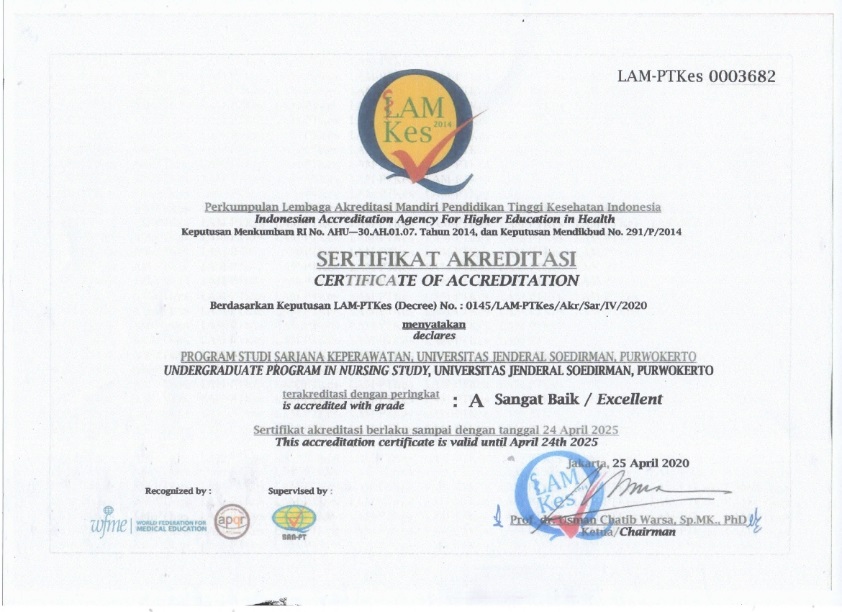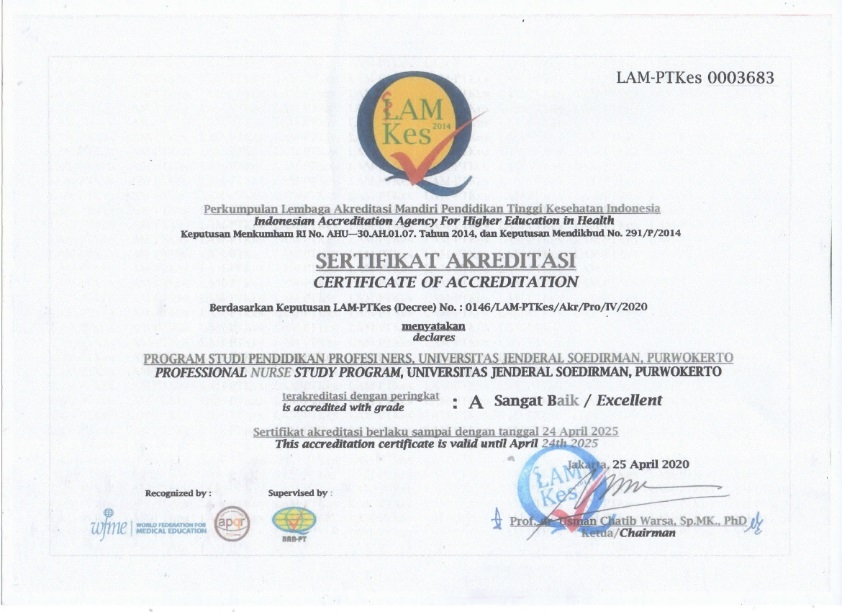Deskripsi Umum | Visi dan Misi | Tujuan Pembelajaran | Kurikulum | Modul l Kerjasama
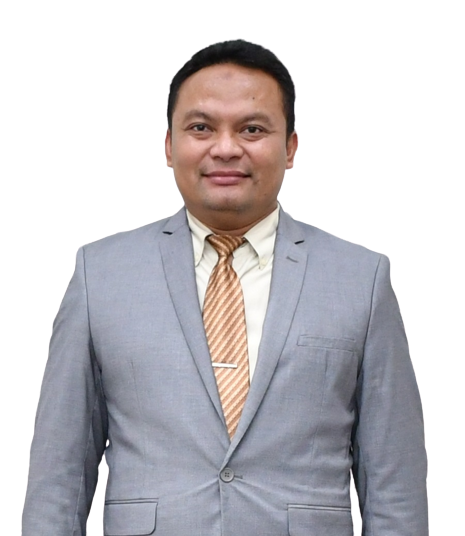
(Ketua Jurusan)
Sambutan Ketua Jurusan Keperawatan
Selamat datang di Jurusan Keperawatan Fakultas Ilmu-Ilmu Kesehatan Universitas Jenderal Soedirman. Saat ini Jurusan Keperawatan memiliki Program studi sarjana Keperawatan dan profesi Ners. Proses pendidikan di Jurusan ini berupaya mencetak lulusan keperawatan yang berkompeten dalam pengetahuan, keterampilan, leadership dan praktik klinik keperawatan. Dalam beberapa tahun ini, Jurusan Keperawatan menempati peringkat pertama terbaik nasional dalam Ujian Kompetensi Ners Indonesia. Tahun ini merupakan awal periode kepemimpinan saya sebagai Ketua Jurusan, bersama dengan Dian Ramawati, Ph.D sebagai Sekretaris Jurusan. Bersama dengan semua elemen, banyak program pengembangan yang akan Jurusan laksanakan pada tahun-tahun mendatang. Pada tahun 2019 ini, Jurusan Keperawatan membuka program Kelas Internasional dan Program magister yang menjadi jawaban atas tantangan bidang kesehatan di dunia. Saat ini Jurusan Keperawatan telah meluluskan lebih dari 1000 alumni yang telah bekerja di berbagai institusi kesehatan di Indonesia dan luar negeri dengan masa tunggu 3 bulan.
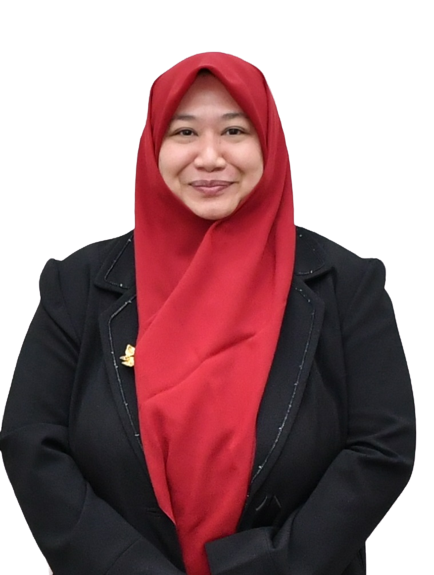
Peran semua civitas akademik termasuk mahasiswa, komitmen untuk menuju lebih baik, dan kebersamaan yang erat menjadi penentu untuk keberhasilan proses pendidikan. Silahkan meluangkan waktu untuk melihat isi website untuk mengetahui lebih dalam tentang Jurusan dan kegiatan yang telah kami lakukan, dan kami berharap anda dapat bergabung dengan Jurusan Keperawatan.
Program Studi Ilmu Keperawatan didirikan berdasarkan Surat Keputusan Direktur Jenderal Pendidikan Tinggi Nomor 598/D/T/2005 tanggal 02 Maret 2005.
Pada saat awal berdirinya Program Studi Ilmu Ilmu Keperawatan menginduk pada Fakultas Biologi dan menerima mahasiswa baru untuk pertama kali pada tahun akademik 2005/2006.
Terimakasih
Sejarah Berdirinya Program Studi Keperawatan dan Perkembangan Sampai Saat ini
Sejarah
Program Studi Ilmu Keperawatan didirikan berdasarkan Surat Keputusan Direktur Jenderal Pendidikan Tinggi Nomor 598/D/T/2005 tanggal 02 Maret 2005. Pada saat awal berdirinya Program Studi Ilmu Ilmu Keperawatan menginduk pada Fakultas Biologi dan menerima mahasiswa baru untuk pertama kali pada tahun akademik 2005/2006, yang pelaksanaan perkuliahan pada bulan September 2005 menempati gedung di karangwangkal, Program Studi Ilmu Keperawatan saat itu hanya memiliki dua ruang perkuliahan dengan kapasitas masing-masing ruang 80 mahasiswa. seiringnya perjalanan waktu Program Studi Ilmu Keperawatan sekarang sudah memiliki 4 ( empat ) ruang perkuliahan dengan luas masing-masing ruangan 90 m2.
Perkembangan Sekarang
Saat ini Program Studi Keperawatan telah menjadi Jurusan Keperawatan yang memiliki Program Studi S1 Keperawatan, Program Profesi Ners, Program Studi S1 Keperawatan Kelas Internasional. Program alih jenjang dari D3 keperawatan juga dilaksanakan dengan bekerjasama dengan BPPSDM DepKes.
Pendidikan Ners terdiri atas kurikulum pendidikan akademik (Sarjana Keperawatan) dan kurikulum pendidikan profesi (Ners) sesuai dengan Kurikulum Nasional Pendidikan Ners Indonesia Tahun 2021 ISBN 978-602-51526-8-9.
PROGRAM SPECIFICATIONS OF THE SCHOOL OF NURSING
| 1 | Institution | Universitas Jenderal Soedirman | |
| 2 | Program Name | Bachelor of Science in Nursing (BSN) leading to Professional Nurse (PN) | |
| 3 | keperawatan@unsoed.ac.id | ||
| Website | https://fikes.unsoed.ac.id/s1-keperawatan/ | ||
| Contact Person | Dian Ramawati, Email: dian.ramawati@unsoed.ac.id | ||
| 4 | Program Title | Bachelor of Science in Nursing/BSN (Sarjana Keperawatan/S.Kep) | |
| Professional Nurse/PN (Ners) | |||
| 5 | Established at | March 2, 2005 (Registration number 598/D/T/2005) | |
| 6 | The standard period of study, Credit Points gained, and Mode of study | 10 Semesters BSN: 7 semesters (144 Credit Points equivalent to 264,79 ECTS) PN: 2 semesters (36 Credit Points equivalent to 65.16 ECTS) Full time | |
| 7 | Intake | August of every year | |
| 8 | Number of students | 461 students in June 2022 | |
| 9 | Accreditation | The BSN Program earned a grade “A” accreditation from the Indonesian Accreditation Agency for Higher Education in Health (IAAHEH) on April 25, 2020, which is valid until April 25, 2025 (0145/LAM-PTKes/Akr/Sar/IV/2020) | |
| The PN Program earned a grade “A” accreditation from the Indonesian Accreditation Agency for Higher Education in Health (IAAHEH) on April 25, 2020, which is valid until April 25, 2025 (0146/LAM-PTKes/Akr/Pro/IV/2020) | |||
| 10 | Program Description | The Bachelor of Science in Nursing (BSN) degree leads to the Professional Nurse (PN) program, which prepares students to become professional nurses who provide excellent nursing service with global competitiveness based upon local wisdom. Using an outcome-based curriculum, supported by outstanding faculty and staff, and extensive learning resources, students have the opportunity to develop their professional knowledge, skills, and attitudes necessary for professional practice. It not only helps students to earn a degree but also prepares them to pass the national competency test and continue their professional development. Over the last three years, 100% of the students from Universitas Jenderal Soedirman’s BSN program passed the Indonesian Nursing Competency Examination (INCE). To date, more than 1000 graduates are recognized nationally and have careers in several countries. | |
| 11 | Graduate Profile | Care Provider: Graduates who can plan and provide professional nursing care to clients (individuals/families/community/society) in all nursing service areas, focusing on client safety, using critical thinking throughout the nursing process, and considering legal, ethical, and local wisdom aspects by utilizing technology.Communicator: Graduates who can interact and communicate effectively with clients, colleagues, and other health care teams.Educator and Health Promoter: Graduates who can perform education and health promotion activities by utilizing resources and local wisdom to increase the client’s independency and active participation in taking care of themselves.Manager and Leader: Graduates who can apply leadership principles and care management for a group of patients.Researcher: Graduates who can apply a scientific approach to solve health problems with local wisdom consideration. | |
| 12 | Program Learning Outcome | The BSN leading to the PN Program provides an opportunity for the students to: Plan and provide professional nursing care aimed at clients (individuals/family/community/society) in all service settings focusing on client safety, using critical thinking in the nursing process, as well as considering the legal, ethical, and local wisdom aspects by utilizing technology.Interact and communicate effectively with clients, colleagues, and other healthcare teams.Conduct education and health promotion activities by utilizing local wisdom to increase the client’s independence and active participation in taking care of themselves.Analyze the organization of health care providers and coordinate with the health team by demonstrating an honest, caring, and unyielding leadership attitude to achieve client care goals.Apply a scientific approach in developing nursing science and technology with local wisdom consideration. | |
| 13 | Intended Learning Outcome | : | |
| Attitude (A) | Able to show devotion to God Almighty, demonstrate a professional attitude, apply ethical principles, and have legal and cultural perspectives in nursing based on the values of honesty, caring, and persistent in performing duties in the field of nursing. | ||
| Knowledge (K) | Able to master the application of nursing science and general skills in the field of nursing. | ||
| Skill (S) | S1 | Able to utilize technology for the development of nursing care. | |
| S2 | Able to develop and improve continuous professional skills in nursing | ||
| Competence (C) | C1 | Able to apply the concept of resources, culture, and local wisdom in providing nursing services. | |
| C2 | Able to provide professional nursing care based on Evidence Based Practice (EBP) to improve the quality of nursing care and client safety. | ||
| C3 | Able to communicate effectively and collaborate in providing nursing care. | ||
| C4 | Able to provide education and health promotion to individuals, families, and communities. | ||
| C5 | Able to build leadership and management capacity in accordance with the area of expertise in nursing | ||
| C6 | Able to apply scientific method in the field of nursing science and technology to solve health problems. | ||
| 14 | Admission Requirements | There are three types of student admissions: National Selection for Public University Admission (SNMPTN) is a school-based admission process where students are selected. Based on their academic performance. Requirements: Students who graduated from high school in the last three years with outstanding academic performance. (20%)Joint Admission Selection for Public Universities (SBMPTN) is an admission process where students are selected through a national system of university admission tests. Requirements: Students register for the national test. (30%)Local University Admission (Mandiri) is an admission process where students are selected through a university entry test. (50%) Learn more about applying and admission here:(https://pendaftaran.spmb.unsoed.ac.id/) | |
| 15 | Special Requirements | Not completely or partially color blind | |
| 16 | Additional Course Rules | BSN Program: Students must have completed at least 90 credits to take the Community Service CourseStudents must complete 144 credits with a GPA of ≥2 on a 4.0 scale and do not have an E in any course to graduate PN Program: Students must complete 36 credits with a GPA of ≥3 on a 4.0 scale and do not have a D in any course to graduate. Drop out: For the BSN Program, students will be assessed in the first two years for academic achievement and are entitled to drop out if their study period is more than 14 semesters. As for the PN Program, the student’s study period cannot be more than 6 semesters. | |
| 18 | Program Structure and Content | The achievement map from the first to the fourth year has an organized structure from simple to complex and basic to advanced, making it easier for students to achieve five graduate profiles. BSN Program (Year 1-4) In the first year, students learn the basics of nursing and complete compulsory university content courses to build their character. In the second to fourth year, students study compulsory nursing courses and local content courses. PN Program (Year 5) In the fifth year, students learn professionally on the field to practice providing nursing care. The process begins with the orientation and learning of basic nursing practice. For two semesters, students would apply nursing care to patients in 8 nursing areas, both in clinical and community settings. With a variety of learning methods and over 1632 hours of clinical practice, this course is suitable for nursing studies. | |
| 19 | Learning Strategies and Assessment | At the academic level (BSN) Learning strategies/Study method: Attitudes: Lectures and discussion, project-based learning, discovery learning, carousel, role play, Small Group Discussion (SGD), seminars, Case-Based Learning (CBL), jigsaws, field trips, and debate sessions. Knowledge: Lectures and discussion, Project-Based Learning (PjBL), discovery learning, carousel, role play, Small Group Discussion, seminars, jigsaws, case-based learning, independent learning, self-directed learning, and debate sessions. Skills: lecture and discussion, project-based learning, discovery learning, practicum, independent learning, self-directed learning, independent learning, and debate sessions. Competence: project-based learning, role play, case-based learning, practicum, independent learning, and field visits. Learning Assessment: Attitudes: written exams, reports (structured assignment), performance discussions, presentations, role play appearance, microteaching appearance, peer assessments, consultations, and project results. Knowledge: written exams, case reports (from SGD), case reports (from CBL), structured assignment reports, PjBL result design reports, performance discussions, presentations, role play appearance, presentations, and project results. Skills: project presentations, structured assignment reports, planned/PjBL result reports, practical exams, clinical performance, consultation, project results, and teaching media. Competence: written exam, case reports (from CBL), structured assignment reports, planned PjBL result reports, practical exam, role play, microteaching, peer assessments, project results, teaching media, and Objective Structured Clinical Examination (OSCE). At Professional Stage (PN) Learning strategies/Study method: Attitudes: pre- and post-conference, nursing rounds, role modeling, seminar/presentations, case discussions, tutorials, problem-solving for better health (PSBH), role play, and project-based learning. Knowledge: case discussion, case-based learning, and independent learning. General Competencies: independent learning Skills: nursing rounds, role modeling, bedside teaching, demonstrations, tutorials, PSBH, role play, project-based learning, and independent learning. Learning Assessment: Attitudes: logbooks, portfolios, case reflection discussion, extraordinary events reports, and clinical competency exams. Knowledge: literature review (scientific paper), Student Oral Case Analysis (SOCA), case reflection discussions, critical incident reports, and clinical competency exams. Skills: literature review (scientific paper) Competence: logbook, portfolio, Student Oral Case Analysis (SOCA), case reflection discussions, extraordinary events reports, mini cex, Direct Observational Procedures (DOPS), reports (preliminary, assignments, nursing care, projects), clinical competency exams, literature review, presentation, and Objectives Structured Long Examination Record (OSLER). | |
| 20 | International Students Admission | Yes | |
| 21 | Students’ International Experience | Guest lecturesInternational Credit TransferStudents’ short visitInternational conferences | |
| 22 | Learning Facilities | Extensive learning facilities are available, including:ClassroomsLaboratoriese-librarye-learning facilitiesSports centerHospitalsCareer centerCounseling centerStudent centerStudent dormitoryCentral library | |
| 23 | Course benchmark | Universitas AirlanggaUniversitas HasanuddinUniversitas Gadjah MadaUniversitas IndonesiaPrince of Songkla University | |
| 24 | Academic staff | In total, there are 38 academic staff: 1 Professor, 2 Associate Professors, 32 Assistant Professors, and 3 Lecturers | |
| 25 | The date on which the specification program was revised | July 1, 2022 | |
Staff Pendidik
Laboratorium Biomedis Keperawatan
- Dr.Desiyani Nani, S.Kep., Ners., M.Sc.
- Prof.Dr. Saryono, S.Kp., M.Kes
- Hikmi Muharromah Pratiwi, S.Kep.,Ns., M.S.
Laboratorium Keperawatan DKKD
Laboratorium Keperawatan Komunitas, Keluarga, & Gerontik
- Asep Iskandar, S.Kep., M.Kep., Ns., Sp.Kep.Kom.
- Dr.Endang Triyanto, S.Kep. Ners., M.Kep
- Koernia Nanda Pratama, S.Kep., Ns., M.Kep., Sp.Kep.Kom.
- Lita Heni Kusumawardani, M.Kep., NS.Sp.Kep.Kom.
- Eva Rahayu, S.Kep., Ns., M.Kep.
- Rahmi Setiyani, S.Kep., Ns., M.N.
Laboratorium Keperawatan Maternitas
- Lutfatul Latifah, S.Kep. NS, M.Kep, Sp.Mat.
- Mekar Dwi Anggraeni, S.Kep., Ners., M.Kep., Ph.D.
- Aprilia Kartikasari, S.Kep., Ns., M.Kep.
- Nina Setiawati, S.Kep., Ns., M.Kep.
Laboratorium Keperawatan Anak
- Eni Rahmawati, S.Kep., Ns., M.Kep.
- Haryatiningsih Purwandari, S.Kep., Ns., M.Kep., Sp.Kep.An.
- Erni Setiyowati, S.Kep., Ns., M.Kep., Sp.Kep.An.
- Dian Susmarini, S.Kep.,Ns., M.N.
- Dian Ramawati, S.Kep., Ners., M.Kep.
- Meivita Dewi Purnamasari, S.Kep., Ns., M.Kep.
Laboratorium Keperawatan Medikal Bedah
- Annas Sumeru, Ns., M.Kep., Sp.Kep.M.B.
- Yunita Sari, S.Kep, Ns., M.H.S., Ph.D.
- Dr.Arif Setyo Upoyo, S.Kp., Ners., M.Kep.
- Atyanti Isworo, S.Kep., M.Kep., Ners.Sp.KMB
- Agis Taufik, S.Kep., M.Kep., Ners.Sp.Kep.M.B
- Nuriya, S.Kep., M.Kep., Ners.Sp.Kep.M.B
- Akhyarul Anam, S.Kep., Ns., M.Kep.
Laboratorium Keperawatan Gawat Darurat
- Arif Imam Hidayat, S.Kep., Ns., M.N.S.
- Dr.Sidik Awaludin, S.Kep., M.Kep., Ns., Sp.Kep.M.B.
- Dr.Ridlwan Kamaludin, S.Kep. Ners., M.Kep.
- Dr.Iwan Purnawan, S.Kep., Ns., M.Kep.
- Galih Noor Alivian, S.Kep.,Ns.,M.Kep
Laboratorium Keperawatan Jiwa
- Wahyudi Mulyaningrat, S.Kep., Ns., M.Kep.
- Wahyu Ekowati, S.Kep., Ns., M.Kep., Sp.J.
- Keksi Girindra Swasti, S.Kep., Ns., M.Kep.
- Reza Fajar Amalia, S.Kep., Ns., M.Kep.
Staff Kependidikan
- Ucup Wijayanti, SE
- Rasyim, SE
- Sumbodo Budi, A.Md
- Amin Riyadi
- M. Sudiyanto
Laboran
- Waluyo Sejati, S.Kep., Ns., MM
- Eli Kusmiati, A.Md.Kep
- Sugiyanto
Akreditasi Internasional ASIIN
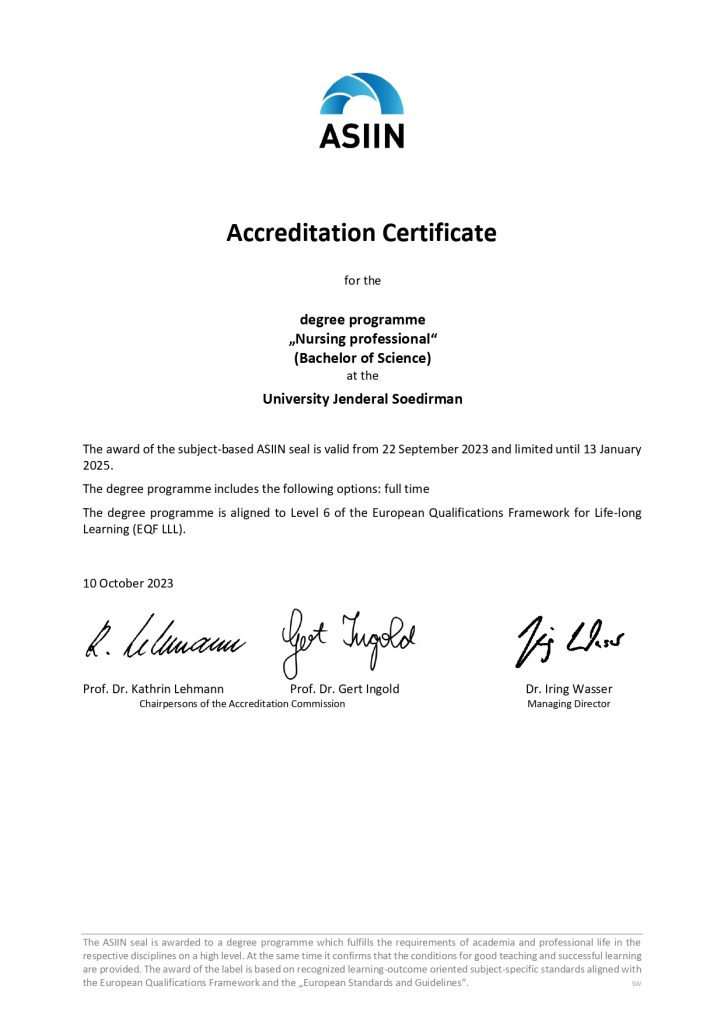
Akreditasi Nasional
